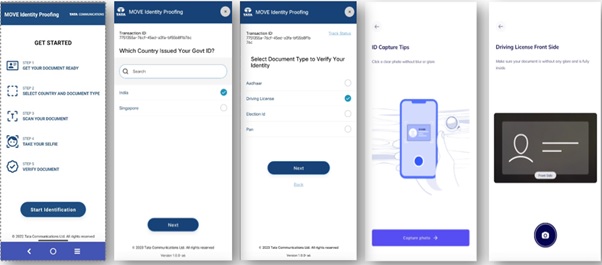For Mobile Virtual Network Operators (MVNOs), the ability to onboard customers seamlessly is key to gaining a competitive edge. In this article, Deepak Gusain, Global Head – Sales & Solutions, Mobility and IoT at Tata Communications, explores how MVNOs are incorporating eKYC (Electronic Know Your Customer) to onboard customers digitally and how this is shaping the future of the industry.
The concept of Know Your Customer (KYC) dates to the early 1990s. KYC involves procedures to verify the identity, suitability, and risks involved with customers. Document and picture capturing used to be completely manual, with a lot of back-office work. This resulted in processes being extremely slow and backlogs being created, which had a significant impact on institutions which heavily relied on KYC for vetting customers.
Through digital transformation, the KYC process has evolved to become more robust and sophisticated. Moving away from a paper-based approach and embracing a digital-first approach resulted in biometric verification, AI and ML based document verification and other innovations drastically decreasing the time required to conduct a KYC check for customers.
 The most noteworthy impact of eKYC, perhaps even more than the enhanced customer experience and convenience, is the greatly improved security that the eKYC process affords. With identity proofing through customer unique document and knowledge possession (two factor authentication) and biometric authentication, KYC has never been more secure. In the past, KYC processes were often standalone procedures that were conducted separately from other business processes. Today, many businesses are integrating their KYC processes with their overall risk management strategies.
The most noteworthy impact of eKYC, perhaps even more than the enhanced customer experience and convenience, is the greatly improved security that the eKYC process affords. With identity proofing through customer unique document and knowledge possession (two factor authentication) and biometric authentication, KYC has never been more secure. In the past, KYC processes were often standalone procedures that were conducted separately from other business processes. Today, many businesses are integrating their KYC processes with their overall risk management strategies.
Understanding MVNOs
Before delving into the specifics of eKYC and digital onboarding, it’s important to understand the MVNO landscape. MVNOs are companies or entities that provide wireless communication services without owning the physical infrastructure of a mobile network. Instead, they lease network access and services from existing mobile network operators (MNOs) to help businesses launch their mobile services. From traditional mobile services to IoT and eSIM based services, today’s MVNOs are looking to offer differentiated customer experiences to serve the changing needs of the customers. They are often known for offering competitive pricing, specialized plans, and flexible services to niche markets.
The Need for Efficient Onboarding
With the growing need for secure remote onboarding and eSIM activation services, efficient customer onboarding has become critical for MVNOs success for several reasons:
- Competitive Advantage: In a highly competitive market, MVNOs need to differentiate themselves by offering a seamless and user-friendly onboarding experience.
- Regulatory Compliance: Compliance with regulations, including anti-money laundering, identity verification and data protection, is paramount in this industry.
- Cost Reduction: Streamlining the onboarding process reduces operational costs and allows MVNOs to focus on growth.
eKYC: The Game-Changer
Electronic Know Your Customer (eKYC) is a technology-driven process that enables businesses to verify the identity of their customers digitally. For MVNOs, eKYC offers several key benefits:
- Swift Verification: eKYC enables real-time identity verification, reducing the time it takes to onboard a new customer. This speed is crucial in attracting and retaining customers in today’s fast-paced world.
- Enhanced Security: Digital identity verification is more secure than traditional paper-based methods. It helps MVNOs protect against fraud and ensures that only legitimate customers gain access to their services.
- Compliance: eKYC solutions can be tailored to meet regulatory requirements, helping MVNOs stay in compliance with data protection and telecom regulations.
- Convenience: Customers appreciate the convenience of digital onboarding, eliminating the need to visit physical stores or submit paper documents.
 How MVNOs can enhance customer onboarding experience
How MVNOs can enhance customer onboarding experience
As the telecommunications industry continues to evolve, MVNOs that embrace eKYC and digital onboarding will gain a competitive edge. By offering a frictionless onboarding experience, MVNOs can attract and retain customers more effectively, comply with regulations, and reduce operational costs.
Implementing digital onboarding with eKYC involves several key steps:
- Customer Registration: Prospective customers provide their information online.
- Document Verification: Customers upload identity documents (e.g., passport, driver’s license), which are then verified electronically.
- Biometric Verification: Facial recognition and biometric data can be used to further validate the customer’s identity.
- Background Checks: MVNOs can conduct background checks to assess the creditworthiness of customers.
- SIM Card Activation: Once verified, customers can receive their SIM cards and activate their services digitally.
However, it is important that MVNOs find the right eKYC partner — as local regulations are fragmented and vary in each country. Not all providers have “one-size fits all” solution to fulfil all KYC requirements.
Introducing Tata Communications MOVE eKYC Hub
Given the relevance and importance of eKYC, Tata Communications provides eKYC Hub for global coverage and ease of integration. Part of the Tata Communications MOVETM portfolio, the eKYC Hub makes the identification and verification process as easy as capturing ID image and taking a selfie, supported by pre-defined workflows and business processes. The eKYC HUB makes sure that the clients/customer are who they claim to be.
An MVNO can leverage eKYC Hub single interface to offer global eKYC coverage for its local and/or global use cases. With ease of integration, an MVNO can focus on customer experience and deliver a unified global experience.
Customers can get onboarded in a few simple steps from anywhere in the world.
 In an era where digital transformation is reshaping industries, MVNOs cannot afford to overlook the importance of efficient onboarding processes. eKYC and digital onboarding simplify the customer acquisition process, while ensuring security and compliance. By harnessing these technologies, MVNOs can position themselves for success in an increasingly competitive market.
In an era where digital transformation is reshaping industries, MVNOs cannot afford to overlook the importance of efficient onboarding processes. eKYC and digital onboarding simplify the customer acquisition process, while ensuring security and compliance. By harnessing these technologies, MVNOs can position themselves for success in an increasingly competitive market.
To learn more about how Tata Communications is helping drive mobile-enabled IoT and MVNO growth, click here.
Transformational Hybrid SolutionsOur cloud-enablement services offer the best performance on your traffic-heavy websites or mission-critical applications.
Core NetworksTata Communications™ global IT infrastructure and fibre network delivers the resources you need, when and where you need them.
Network Resources
Unified Communications As A ServiceBreak the barriers of borders efficiently and increase productivity with Tata Communications’ UC&C solutions.
Global SIP ConnectEmpower your business with our SIP network and witness it grow exponentially.
InstaCC™ - Contact Centre As A ServiceCloud contact centre solutions for digital customers experience and agent productivity.
Unified Communication Resources Case studies, industry papers and other interesting content to help you explore our unified communications solution better.
IoT SolutionsThe Internet of Things is transforming the way we experience the world around us for good. Find out more about our Internet Of Things related solutions here.
Mobility SolutionsTata Communications’ mobility services enable your enterprise to maintain seamless communication across borders, with complete visibility of cost and usage.
Mobility & IoT Resources
Multi-Cloud SolutionsWith enterprises transitioning to a hybrid multi-cloud infrastructure, getting the right deployment model that yields ROI can be a daunting task.
Cloud ComplianceCompliant with data privacy standards across different countries and is also designed to protect customers’ privacy at all levels.
IZO™ Cloud Platform & ServicesIZO™ is a flexible, one-stop cloud enablement platform designed to help you navigate complexity for more agile business performance.
Managed Infrastructure ServicesIntegrated with our integrated Tier-1 network to help your business grow efficiently across borders.
Cloud PartnersWe support a global ecosystem for seamless, secure connectivity to multiple solutions through a single provider.
Cloud Resources
Governance, Risk, and ComplianceRisk and Threat management services to reduce security thefts across your business and improve overall efficiencies and costs.
Cloud SecurityBest-in-class security by our global secure web gateway helps provide visibility and control of users inside and outside the office.
Threat Management - SOCIndustry-leading threat-management service to minimise risk, with an efficient global solution against emerging security breaches and attacks.
Advanced Network SecurityManaged security services for a predictive and proactive range of solutions, driving visibility and context to prevent attacks.
Cyber Security ResourcesCase studies, industry papers and other interesting content to help you explore our securtiy solution better.
Hosted & Managed ServicesTata Communications provide new models for efficient wholesale carrier voice service management. With our managed hosting services make your voice business more efficient and better protected
Wholesale Voice Transport & Termination ServicesYour long-distance international voice traffic is in good hands. End-to-end, voice access & carrier services which includes voice transport and termination with a trusted, global partner.
Voice Access ServicesTata Communication’s provide solutions which take care of your carrier & voice services, from conferencing to call centre or business support applications.
Carrier Services Resources
CDN Acceleration ServicesOur CDN Web Site Acceleration (WSA) solution helps deliver static and dynamic content, guaranteeing higher performance for your website.
CDN SecuritySafeguard your website data and customers’ information by securing your website from hacks and other mala fide cyber activities.
Video CDNDeliver high-quality video content to your customers across platforms – website, app and OTT delivery.
CDN Resources
Elevate CXIncrease customer satisfaction while empowering your service team to deliver world-class customer experience and engagement.
Live Event ServicesTata Communications’ live event services help battle the share if eyeballs as on-demand video drives an explosion of diverse content available on tap for a global audience.
Media Cloud Infrastructure ServicesTata Communications’ media cloud infrastructure offers flexible storage & compute services to build custom media applications.
Global Media NetworkTata Communications’ global media network combines our expertise as a global tier-1 connectivity provider with our end-to-end media ecosystem.
Use CasesUse cases of Tata Communications’ Media Entertainment Services
Remote Production SolutionsMedia contribution, preparation and distribution are highly capital-intensive for producers of live TV and video content, and their workflows are complex.
Media Cloud Ecosystem SolutionsThe Tata Communications media cloud infrastructure services offer the basic building blocks for a cloud infrastructure-as-a-service.
Global Contribution & Distribution SolutionsTata Communications’ global contribution and distribution solution is built to reduce capital outlay and grow global footprint.
Satellite Alternative SolutionsAs more and more consumers choose to cut the cord & switch to internet-based entertainment options, broadcasters are faced with capital allocation decisions.
LeadershipA look into the pillars of Tata communications who carry the torch and are living embodiment of Tata’s values and ethos.
Culture & DiversityHere at Tata Communications we are committed to creating a culture of openness, curiosity and learning. We also believe in driving an extra mile to recognize new talent and cultivate skills.
OfficesA list of Tata Communications office locations worldwide.
FAQCheck out our FAQs section for more information.
SustainabilityOur holistic sustainability strategy is grounded in the pillars of People, Planet and Community with corporate governance at the heart of it.
BoardHave a look at our board of members.
ResultsFind out more about our quarterly results.
Investor PresentationsFollow our repository of investor presentations.
FilingsGet all information regarding filings of Tata communications in one place.
Investor EventsAll investor related event schedule and information at one place.
GovernanceAt Tata, we believe in following our corporate social responsibility which is why we have set up a team for corporate governance.
SharesGet a better understanding of our shares, dividends etc.
SupportGet all investor related contact information here.


